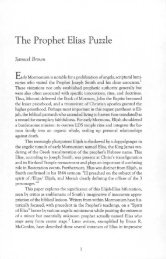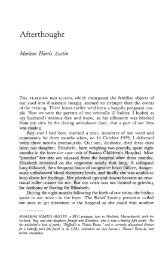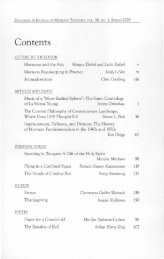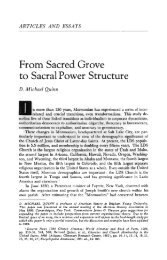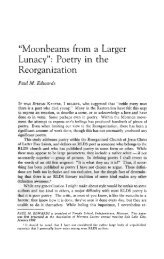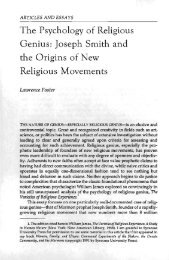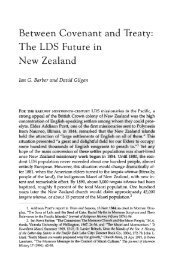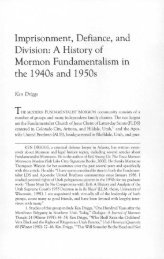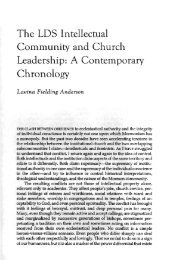Dialogue, Volume 25, Number 2 - Dialogue – A Journal of Mormon ...
Dialogue, Volume 25, Number 2 - Dialogue – A Journal of Mormon ...
Dialogue, Volume 25, Number 2 - Dialogue – A Journal of Mormon ...
You also want an ePaper? Increase the reach of your titles
YUMPU automatically turns print PDFs into web optimized ePapers that Google loves.
90 DIALOGUE: A JOURNAL OF MORMON THOUGHT<br />
newsletter-editor type, overeducated and seriously introverted. Single<br />
most <strong>of</strong> my life, I had never before held a position <strong>of</strong> any sort in the<br />
Primary. I did have two children; but they were only one and three<br />
years old, produced in somewhat <strong>of</strong> a rush when I finally got married<br />
in graduate school. And I was very much a novice parent, unable to<br />
effectively discipline my own children, which was embarrassing to me<br />
since I had on a number <strong>of</strong> occasions sat behind families in Church<br />
and foolishly commented, "I will never let my children behave like<br />
that!" I received my just comeuppance and learned never to criticize<br />
people in authority for the unseemly behavior <strong>of</strong> their underlings, minions,<br />
or children — even God. I don't hold him as accountable for Stalins<br />
or Joseph Mengeles as I once did (or even for Church leaders who<br />
want to rid the Church <strong>of</strong> alternate opinions). My children have taught<br />
me that even though I'm bigger and smarter and The Boss, I don't<br />
know what they are going to think <strong>of</strong> doing next.<br />
So at age thirty-six, I was frightened <strong>of</strong> children in large numbers,<br />
more than, say, three or four. Oh, and I was also two weeks pregnant,<br />
as it turned out. Frankly, I spent most <strong>of</strong> my very long year and a half<br />
as Primary president trying to avoid any direct contact with the children.<br />
I became a master delegator. I excelled at presidency meeting<br />
agendas, telephone calls, and orientation manuals.<br />
Yet I did not accept the calling expecting to spend all my energy<br />
on administrative tasks.<br />
We were newcomers to our Salt Lake ward, fresh from the graduate<br />
schools <strong>of</strong> Penn State University. Our new ward had an unusually<br />
high ratio <strong>of</strong> active to inactive — not to mention those stalwart souls,<br />
the overactive — members. During our one year there, I had had another<br />
calling for which I was perhaps better suited: assistant to the Table<br />
Decorations Chairman for the Relief Society luncheons. (We weren't<br />
chairwomen or chairpersons yet —not in my ward, anyway.) It was a<br />
nice, low-pr<strong>of</strong>ile job; I mostly set tables and tied yarn bows on sixty to<br />
seventy napkins a month. After coming from a small ward where I<br />
had juggled four callings while teaching freshman literature and composition<br />
courses and struggling to keep up with graduate seminars,<br />
pregnancy, and preschoolers, I was ready to tie yarn bows on napkins<br />
into the millennium if the need arose. All my ambitions to be productive<br />
and creative had been temporarily burned out.<br />
But our bishop was concerned that we would not feel part <strong>of</strong> our<br />
ward or that our spirits might atrophy without a chance to be <strong>of</strong> more<br />
significant service. And I believe he was right: I need to serve, and<br />
only the Church makes me stretch beyond my comfort zones. I was<br />
called to Primary, and my husband was called to the elder's quorum<br />
presidency. He was at the time a zealous new convert <strong>of</strong> three years








